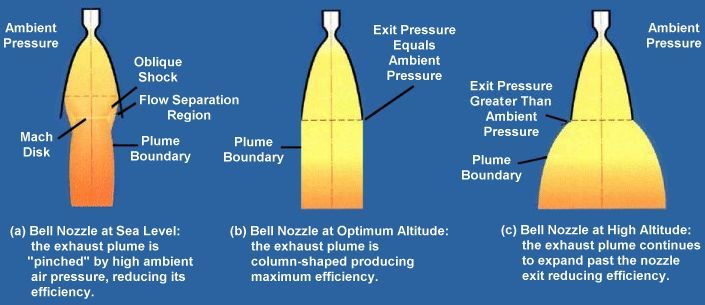Patrix says on 3/27/18
It is easy to perform a controlled experiment (which have been done numerous times) that disproves rockets would work in an unrestricted vacuum such as space. All needed is to show that when a gas is allowed to expand freely, it performs no work. That alone disproves that rockets can create thrust in vacuum and the physical law is called free expansion. And no work, means no action and that in turn means no reaction and thus "no Newton"
Bongostaple on 3/29/18 says
The burning rocket fuel is not going to waste its energy pushing on the inside of the chamber when in fact it can escape into space without any resistance at all. The path of least resistance. And because of this, there will be no thrust generated.
As promised I will explain the errors in applying the Free Expansion of Gas experiment (one of the Joules-Thomson experiments) as a proof that rockets cannot fly in space. I take no position as to whether they can or can't. My point is that this particular argument is invalid-- largely because it piggybacks on the idea that rockets must push on ground or air. However there are other errors in its presentation and applicability.
Before hoping to apply the Free Expansion experiment you have to know a little about it, and why it characterizes the gas as "doing no work".
What work is & isn't: if I jump up & down for 3 days in my living room til I drop dead, I've committed no work; the heart within my chest does no work; the sheepdog who works sheep all day hasn't worked; if I walk 20 miles, move a pencil from one side of a table to another and walk 20 miles back, then my only work was moving the pencil. In physics work means that one moves something external to oneself.
The Free Expansion Experiment takes place within an insulated vacuum chamber. A gas under some degree of pressure is confined at one end. The confining partition is removed and the gas expands, supplying certain info to the scientist. Tell me, given that the gas was alone in the chamber did it have the possibility to do work? The scientist notes that the gas within the experiment has "done no work" in order to make clear that the gas was in free expansion-- i.e., that the data he collected pertains to a gas in free expansion. He is describing his experiment, not making universal statements about gases outside of his experiment.
Should you conclude from this experiment that whenever a gas encounters an insulated (temperature-constant) space that it cannot do work (move something else)?
Should you conclude from this experiment that whenever a gas encounters vacuum that it cannot do work? I note that there are many industrial processes that occur within vacuum, and some of them, especially within the food industry, involve the use of gases.
Two more errors about gases and vacuum occur when on May 25, 2013 Boethius says,
"Free Expansion states that when a pressurized gas is exposed to a vacuum the gas expanding into the vacuum without any work being done. The gas is not “pulled” or “sucked” into the vacuum nor is it “pushed” out of the high-pressure container. In other words no work is done, no heat or energy is lost.
"No work is done, no heat or energy is lost?" Irrelevant. We want to know mass x velocity of the gas just
prior to exiting. That is the transactional force between the rocket & gas.
"The gas is not. . . pushed out of the high-pressure container." Vacuum is not a force. It certainly can't cancel the high velocity push at which high pressure gas travels into 0 pressure. You yourself have seen at lift-off that the high pressure gas exits violently at great speed into the lower pressure of our atmosphere.
You have probably seen movie depictions of the explosive decompression of passenger aircraft, when a hole in the cabin allows cabin-pressure air to escape into the thinner, lower-pressure atmosphere of 40,000 feet. The velocity is determined by the differential in pressure.
But Free Expansion & whether gases can perform work in vacuum is irrelevant to whether Rockets can travel in vacuum. The conditions met by the exhaust after separation from the rocket cannot affect the rocket's propulsion.
The propulsion force of rockets is the transactional force of the exhaust which is apportioned between the rocket & exhaust an instant
before separation*. As I sit in my wheeled chair and push on the sandbag, the instant just before separation determines the force on the sandbag and the backward force on the chair. Doesn't matter what happens to the sandbag later. Wheeled chairs don't propel themselves by pushing on air with thrown sandbags. Rockets don't propel themselves by pushing on air or ground or vacuum with expelled exhaust.
*If you go through all the motions preparatory to separation (pushing on the sandbag or allowing the gas to gain traction in the nozzle, for example) and then stop without separation, no force will result.
Thank you for the mental exercise, gentlemen.
